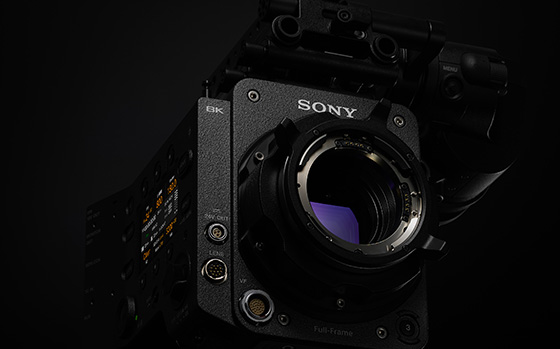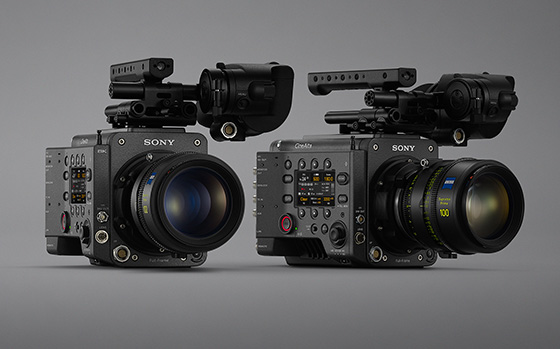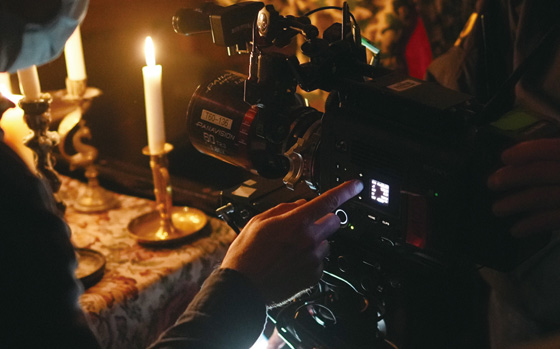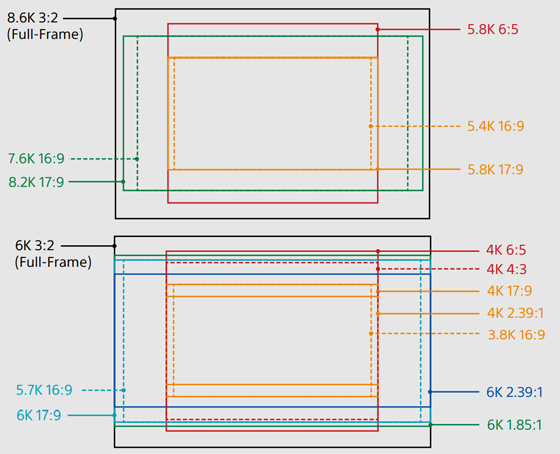
BE THE FIRST TO KNOW
Subscribe to receive exclusive promotions, updates, and industry news straight to your inbox!
From sony: The history of digital motion picture camera technology started in
1999, when Sony released the first 24p digital motion picture
production system. In 2006, we unveiled the world’s first 4K digital
cinema projection system, influencing and increasing demand for
high-quality digital content in 4K. Then we introduced the F65, F55
and F5 motion picture camera systems, which have been used on
many productions and supported by many users from the cinema
industry worldwide.
Then, in 2017, Sony introduced a next-generation motion picture
camera system, focused on large format production: the VENICE.
Working with extensive and detailed input from the film industry,
we designed VENICE to give cinematographers more creative
freedom. A 6K image sensor offered incredible detail and colors.
Dual-base ISO drove remarkable low-light performance. An 8-step
internal ND filter mechanism saved precious time on set.
Now, VENICE 2 builds on this success, with new capabilities in a
familiar, compact body.

The brand-new VENICE 2 8.6K CMOS sensor features an impressive 16-stop dynamic range, and the camera body features numerous updates including internal recording onto a high-speed AXS card, internal recording formats up to ProRes 4K 4444 and 422 HQ, an interchangeable sensor, and updated usability and body design. The camera promises to be a vast improvement for DPs, camera assistants, colorists, VR, and VFX departments with its high-resolution capture and beautiful, film-like imagery.

VENICE 2 is a cinema camera created by and for the
cinematographer. The camera comes with one of two
full-frame image sensors, each offering exceptional
picture quality. Thanks to new internal recording
capabilities, users can capture even more colors and
detail within the compact body they already know.
VENICE 2 offers a choice between 8K and 6K
sensors, both of which boast incredibly wide
latitude and gamut. Filmmakers have greater
freedom of expression in grading than ever
before, with either 16 or 15+ stops of latitude
and exquisite color rendition.
Operators need to know their camera is reliable
and usable, especially during demanding shoots.
VENICE 2 features simple menu navigation and
connectors arranged to make life easier on set.
With a durable, compact build, the camera is fast
to set up for handheld or mounted shooting, so
you can focus on filming, not the camera.

VENICE 2 features one of two 36x24mm full-frame image
sensors, designed specifically for the demands and
performance of high-end cinematography. Each offers
remarkable sensitivity, latitude and color rendition, and
because the sensor blocks are interchangeable, users can
easily switch between sensors—without any extra
firmware—and can even use the sensor from their original
VENICE. The new 8K sensor can capture images up to a
maximum resolution of 8640 x 5760, while the
established 6K sensor offers up to 6048 x 4032. Both
offer powerful oversampling for incredible 4K images.
In full-frame, you can use the full width of the
sensors (8640 or 6048 pixels) for widescreen
spherical 2.39:1 or Large Format Scope. Full-Frame can be used creatively in several ways – for
example, to allow for extra shallow depth of field
or super-wide shooting.
For anamorphic shooting and production,
Super35 full height 2x squeeze anamorphic is
supported.
These popular imager sizes have native support
in VENICE 2, and the 8K sensor makes it possible
to capture 5.8K footage in these modes. Current
Super35mm PL mount lenses can be used as well.
Using the 6K sensor, the camera records only the
active area but the viewfinder and on-set
monitors can display a 5% margin around it.
Surround View supports three imager modes:
3.8K 16:9, 4K 17:9 and 4K 4:3

VENICE 2’s 8K sensor has an exceptional 16
stops of latitude, while the 6K sensor boasts
15+ stops of latitude. This means that both
imagers can deliver phenomenal images with
very little noise, in conditions that range from
searing sunlight to almost no light. VENICE 2
also excels at High Dynamic Range imaging,
allowing for unprecedented creative freedom
in grading.
VENICE 2 features dual base ISO, meaning that
the 8K sensor offers Base ISO3200 in addition
to Base ISO800, while the 6K sensor has Base
ISO500 and Base ISO2500. 8K sensor excels in
low-light, High Dynamic Range capture, with an
exposure latitude from 6 stops over to 10 stops
under 18% Middle Gray, for a total of 16 stops.
6K sensor offers an exposure latitude from 6
stops over to 9 stops under 18% Middle Gray,
for a total of 15+ stops.
VENICE 2 can exceed the BT.2020 color space,
with a color range wider than DCI-P3. This
means it can beautifully reproduce the true color
of the scene in front of your lens. The camera
also provides a broad palette in the grading
suite, using the established workflow of Sony’s
S-Log3 and Ultra-wide Color space, S-Gamut3.
Plus, VENICE 2’s 8K and 6K sensors match colors
almost perfectly, making your grading
experience even better.
VENICE 2 can shoot at speeds of up to 120fps at
4K and 90fps at 6K, when using the 6K sensor. In
combination with an anamorphic license, it also
allows shooting at speeds of up to 75fps at 4K
4:3 and 72fps at 4K 6:5. With the 8K sensor,
VENICE 2 can achieve up to 60fps at 8.2K and
90fps at 5.8K.
Jello effect is something we don’t need when
filming. VENICE 2 has high speed readout
sensors that minimize the jello effects typical
with CMOS sensors.
VENICE 2 comes with the industry-standard PL lens mount, and is
compatible with all Super35 and full-frame PL lenses—spherical and
anamorphic. The lens mount includes contacts that support Cooke/i
Technology, and lens information is recorded as metadata, frame by
frame. We have also added support for ZEISS eXtended Data.
E-mount offers unsurpassed compatibility with Sony lenses. E-mount
(lever lock type) gives users the ability to change lenses by rotating
the locking collar rather than the lens itself, which means that in most
cases lens support rigs don’t need to be removed, saves time during
a production.
For tips and independent advice follow us on:
Facebook: www.facebook.com/visualimpactbroadcast
Twitter: www.twitter.com/Visual_ImpactUK
Instagram: www.instagram.com/visualimpactuk
Youtube: www.youtube.com/user/visualimpactuk